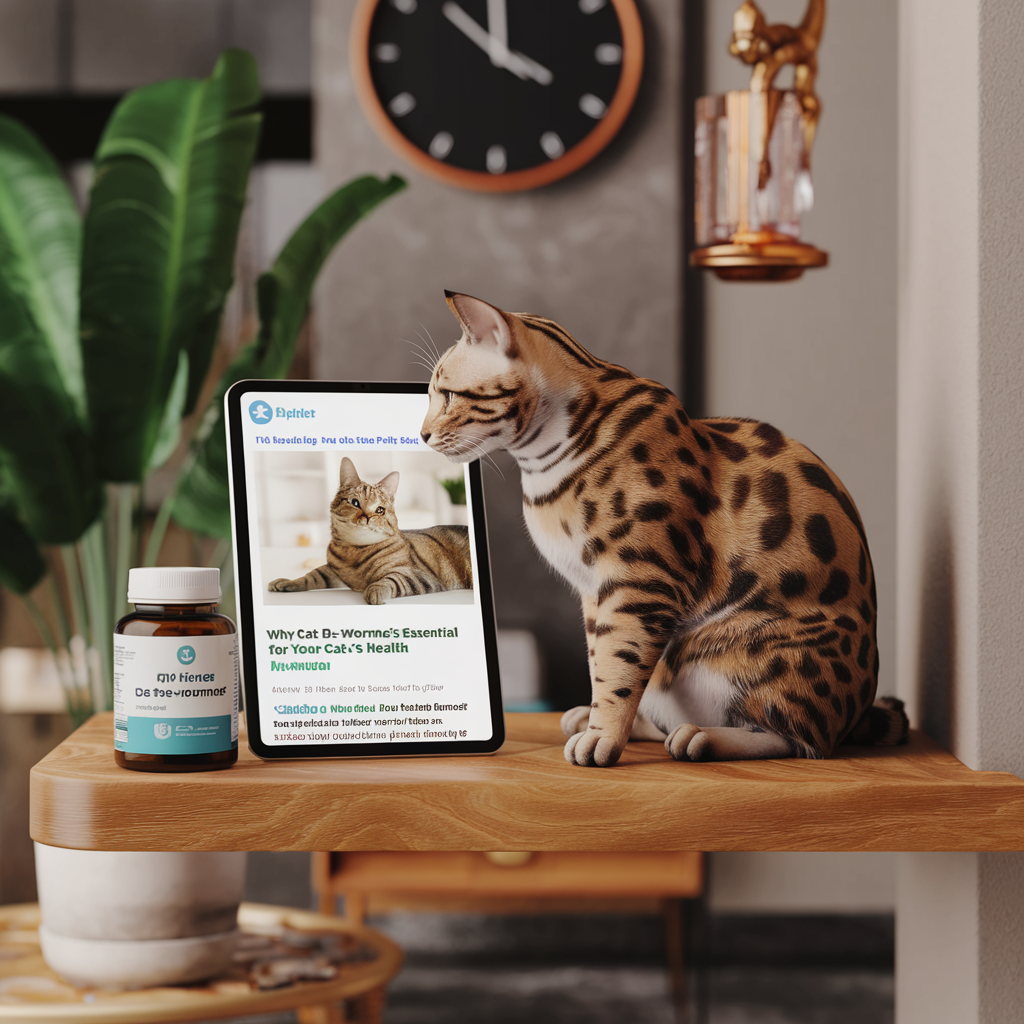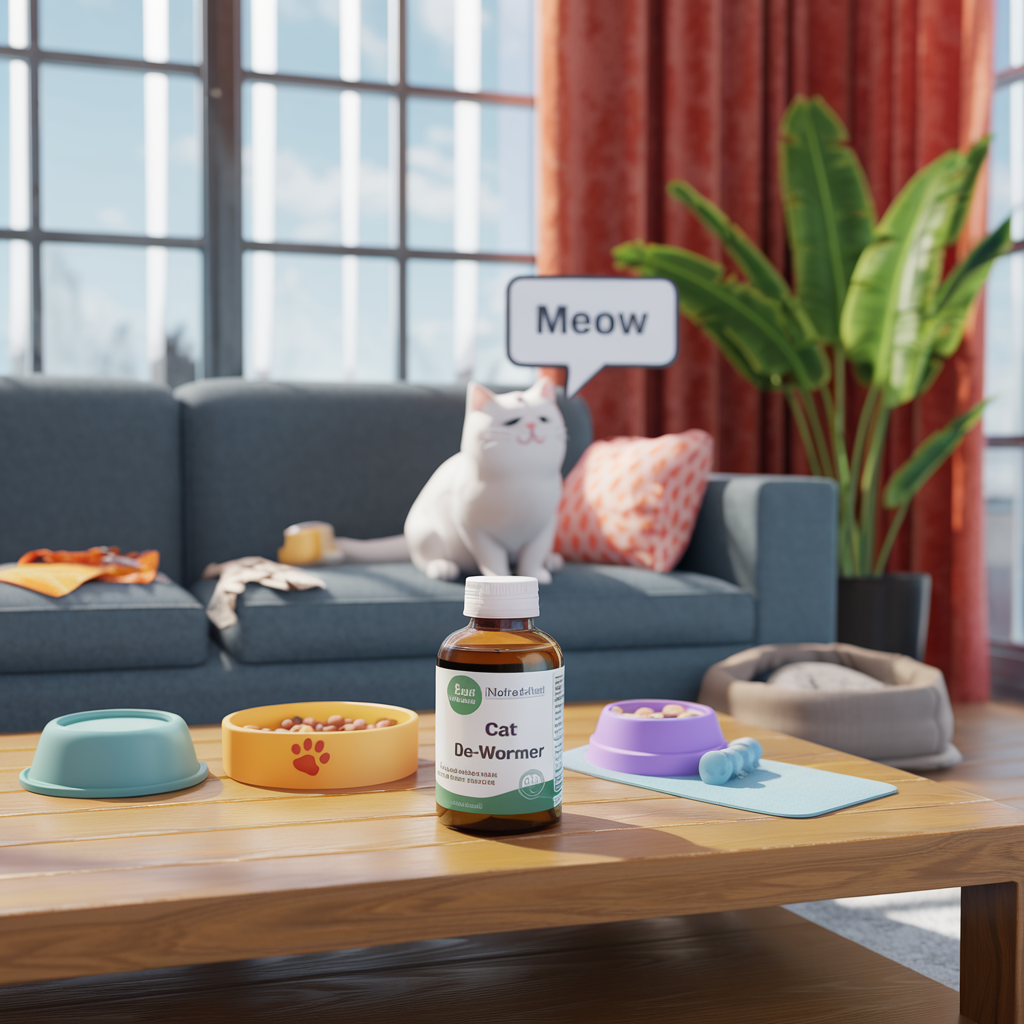The Importance of Cat De-Wormer: Protecting Your Feline Friend
Cats are beloved companions, cherished for their playful personalities, independence, and the comfort they bring into our lives. However, as a responsible cat owner, ensuring your feline friend’s health goes beyond just providing food, water, and a loving environment. One critical aspect of cat care that is often overlooked is regular de-worming. The importance of cat de-wormer cannot be overstated, as it plays a vital role in maintaining your cat’s overall health and well-being. This comprehensive guide will delve into why de-worming is essential, the risks associated with intestinal parasites, and how regular de-worming can safeguard your cat’s health.
Understanding Intestinal Parasites: A Hidden Threat
Intestinal parasites are a common issue in cats, particularly in kittens, outdoor cats, and those who have frequent contact with other animals. These parasites include roundworms, tapeworms, hookworms, and whipworms, which can cause various health problems if left untreated. Understanding the importance of cat de-wormer starts with recognizing the dangers these parasites pose to your cat’s health.
Common Types of Intestinal Parasites
- Roundworms: The most common intestinal parasite in cats, especially in kittens. They can cause vomiting, diarrhea, weight loss, and a pot-bellied appearance.
- Tapeworms: Typically acquired by ingesting infected fleas. Tapeworms attach to the intestines, leading to weight loss and irritation around the anus.
- Hookworms: These parasites feed on your cat’s blood, causing anemia, weight loss, and weakness. They can be particularly dangerous for kittens.
- Whipworms: Less common but still a threat, whipworms can cause bloody diarrhea, weight loss, and dehydration.
These parasites not only affect your cat’s health but can also pose a risk to humans, particularly young children and those with weakened immune systems. This is why the importance of cat de-wormer is paramount in maintaining a healthy household.
The Risks of Intestinal Parasites to Your Cat’s Health
Intestinal parasites can have severe consequences on your cat’s health, especially if left untreated. Here are some of the risks associated with these parasites:
- Nutritional Deficiencies: Parasites feed on the nutrients your cat consumes, leading to deficiencies that can affect growth, energy levels, and overall health.
- Weight Loss: As parasites consume nutrients and blood, your cat may experience significant weight loss, even with a healthy appetite.
- Anemia: Blood-sucking parasites like hookworms can cause anemia, leading to weakness, lethargy, and in severe cases, death.
- Gastrointestinal Issues: Parasites can cause a range of gastrointestinal problems, including vomiting, diarrhea, and constipation.
- Immune System Compromise: A heavy parasite load can weaken your cat’s immune system, making them more susceptible to other illnesses.
- Transmission to Humans: Some intestinal parasites are zoonotic, meaning they can be transmitted to humans, posing a risk to your family’s health.
Given these risks, the importance of cat de-wormer becomes evident. Regular de-worming is not just about treating an existing problem but also about preventing future health issues.

Why Regular De-Worming is Crucial
Regular de-worming is a proactive approach to ensure your cat remains healthy and parasite-free. It’s not just about reacting to visible symptoms but about preventing them altogether. Here’s why regular de-worming is essential:
- Prevents Parasite Infestation: Regular de-worming helps prevent the buildup of parasites in your cat’s intestines, reducing the risk of severe infestations.
- Protects Overall Health: By eliminating parasites, de-worming ensures that your cat’s body can absorb nutrients effectively, supporting their growth, energy levels, and immune system.
- Reduces Zoonotic Risk: Regular de-worming minimizes the risk of parasites being transmitted from your cat to humans, keeping your family safe.
- Supports Longevity: A parasite-free cat is likely to live a longer, healthier life, free from the complications associated with intestinal worms.
- Prevents Reinfection: De-worming your cat regularly helps prevent reinfection, particularly if they have frequent exposure to other animals or outdoor environments.
How to Choose the Right Cat De-Wormer
Choosing the right de-wormer is crucial for effectively treating and preventing intestinal parasites in your cat. Not all de-wormers are created equal, and selecting the appropriate one depends on several factors, including your cat’s age, health status, and lifestyle.
Types of Cat De-Wormers
- Broad-Spectrum De-Wormers: These de-wormers target a wide range of parasites, making them a good choice for general prevention and treatment.
- Targeted De-Wormers: These are designed to treat specific types of parasites, such as tapeworms or roundworms. They may be recommended if your cat has been diagnosed with a particular parasite.
- Natural De-Wormers: Some pet owners prefer natural or herbal de-wormers, which can be effective for mild cases or as a preventive measure. However, they may not be as potent as pharmaceutical options.
- Prescription De-Wormers: In some cases, your veterinarian may prescribe a de-wormer, especially if your cat has a severe infestation or is at risk for complications.
Factors to Consider When Choosing a De-Wormer
- Age and Weight of Your Cat: Always choose a de-wormer that is appropriate for your cat’s age and weight. Kittens, for example, require different dosing than adult cats.
- Type of Parasite: If your cat has been diagnosed with a specific type of parasite, choose a de-wormer that targets that parasite effectively.
- Ease of Administration: Consider whether you prefer a de-wormer that comes in tablet, liquid, or topical form. Some cats are easier to medicate than others.
- Veterinary Recommendations: Consult your veterinarian for recommendations, especially if your cat has a pre-existing health condition or is on other medications.
- Frequency of Treatment: Some de-wormers require multiple doses, while others are one-time treatments. Choose one that fits your lifestyle and your cat’s needs.
Signs Your Cat May Need De-Worming
While regular de-worming is recommended, it’s also essential to recognize the signs that your cat may need immediate treatment. Here are some common symptoms that indicate a possible parasite problem:
- Visible Worms: Seeing worms in your cat’s stool or around their anus is a clear sign they need de-worming.
- Vomiting or Diarrhea: Frequent gastrointestinal issues, especially if accompanied by weight loss, may indicate a parasite problem.
- Pot-Bellied Appearance: A swollen or distended abdomen, particularly in kittens, is often a sign of roundworms.
- Lethargy: If your cat seems unusually tired or weak, it could be due to anemia caused by parasites.
- Poor Coat Condition: A dull, rough, or patchy coat may indicate that your cat is not absorbing nutrients properly, possibly due to parasites.
How Often Should You De-Worm Your Cat?
The frequency of de-worming depends on several factors, including your cat’s age, lifestyle, and environment. Here are some general guidelines:
- Kittens: Kittens should be de-wormed every 2-3 weeks until they are 12 weeks old, then monthly until they are 6 months old.
- Adult Cats: For adult cats, de-worming every 3-6 months is generally recommended, especially for those who go outdoors or live in multi-cat households.
- High-Risk Cats: Cats that hunt, roam outdoors, or are exposed to other animals may require more frequent de-worming, possibly every 2-3 months.
- Indoor Cats: Even indoor cats should be de-wormed at least twice a year, as they can still be exposed to parasites through contaminated food, litter, or other animals.
Natural Alternatives and Home Remedies
While pharmaceutical de-wormers are the most effective way to treat and prevent parasites, some cat owners prefer natural alternatives. Here are a few home remedies that may help keep your cat parasite-free:
- Pumpkin Seeds: Rich in cucurbitacin, a compound that can paralyze and expel worms from the digestive tract, pumpkin seeds can be ground up and added to your cat’s food.
- Diatomaceous Earth: This natural powder can be sprinkled on your cat’s food to help eliminate intestinal parasites. Be sure to use food-grade diatomaceous earth.
- Herbal Tinctures: Some herbs, such as wormwood, black walnut, and cloves, are believed to have anti-parasitic properties. Consult a veterinarian before using herbal remedies.
- Garlic: Although controversial, some believe that small amounts of garlic can help repel parasites. However, garlic can be toxic to cats in large quantities, so use with caution.

The Role of Diet in Preventing Parasites
A healthy diet plays a crucial role in preventing parasite infestations. Cats with strong immune systems are less likely to be affected by parasites, and proper nutrition is key to maintaining that strength. Here’s how diet can help:
- High-Quality Protein: Protein is essential for your cat’s immune system. Feed your cat a diet rich in high-quality, animal-based proteins.
- Probiotics: Adding probiotics to your cat’s diet can help maintain a healthy gut, making it less hospitable to parasites.
- Hydration: Ensure your cat has access to fresh water at all times. Dehydration can weaken the immune system, making your cat more susceptible to parasites.
- Avoid Raw Meat: Raw meat can be a source of parasites. Cook your cat’s food or choose commercial cat food that meets high safety standards.
Consulting Your Veterinarian
When it comes to the importance of cat de-wormer, your veterinarian is your best resource. Regular check-ups and fecal exams can help catch parasite problems early, and your vet can recommend the best de-worming schedule and products for your cat. Don’t hesitate to consult your vet if you have any concerns about your cat’s health or if you notice any signs of a parasite problem.
Conclusion: A Healthy Cat is a Happy Cat
In conclusion, the importance of cat de-wormer is clear when it comes to maintaining your cat’s health and well-being. Regular de-worming is a simple yet crucial step in protecting your cat from the dangers of intestinal parasites. By understanding the risks, choosing the right de-wormer, and staying vigilant for signs of parasites, you can ensure that your feline friend lives a long, healthy, and happy life.











